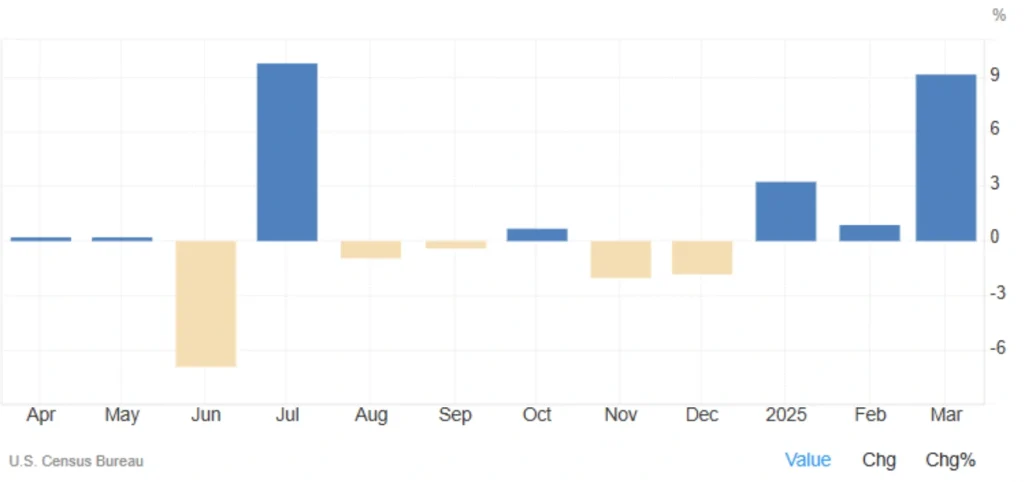
9.2% Surge in Durable Goods Orders in the US
In March 2025, new orders for durable manufactured goods in the United States rose by 9.2%, reaching a total of $315.7 billion. This growth marks the third consecutive monthly increase and far exceeds the market forecast of 2%. Durable Goods Orders play a crucial role in indicating the health of the US economy.
Transportation Sector Leads Growth
The transportation sector, which has experienced steady growth over the past three months, surged by 27% (or $26.5 billion), reaching $124.6 billion. This sharp increase accounted for over 90% of the total growth in orders for durable goods in the US.
However, excluding the transportation sector, overall orders remained almost unchanged, indicating limited growth in other economic sectors.

Business Investment Analysis
Orders for non-defense capital goods excluding aircraft—a key measure of business investment plans—showed only a 0.1% increase in March. This is a slight improvement from a 0.3% decline in February but still below market expectations of 0.2%. These results are part of the analysis of Durable Goods Orders in the US.
✅ This data suggests that businesses remain cautious about long-term investments, likely due to uncertainties related to tariffs and high interest rates.
Read More: How to Trade US and European Stocks with Otet Brokerage
What Are Durable Goods and Why Are They Important?
Durable goods are items that are expected to last more than three years, such as vehicles, aircraft, industrial machinery, and major household appliances. Growth in orders of durable goods typically signals increased consumer and business confidence in the future of the economy.
However, if growth is concentrated in a specific sector, such as transportation, it may not be a strong or sustainable signal of overall economic recovery.
Conclusion: Strong Orders, But Low-Quality Growth?
🔸 The significant increase in durable goods orders in March 2025 is, on the surface, good news for the US economy. However:
- Heavy concentration in the transportation sector (likely driven by tariff concerns).
- Limited growth in other sectors, especially capital goods.
- Uncertainty regarding future business conditions and policy decisions.
Overall, the market is still awaiting stronger signals from businesses before entering a period of genuine economic growth.
Share
Hot topics

Best broker for gold trading
There’s always been a certain magic about gold. Before online charts and trading applications, people stored their wealth in coins and bars, trusting that gold would retain its value during...
Read more




Submit comment
Your email address will not be published. Required fields are marked *